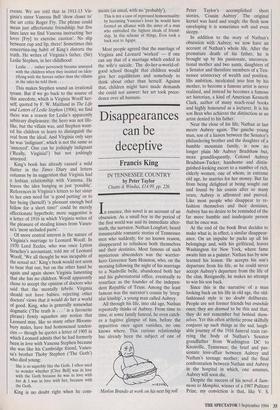Disappearances can be deceptive
Francis King
IN TENNESSEE COUNTRY by Peter Taylor
Chatto & Windus, £14.99, pp. 226 In essence, this novel is an account of an obsession. As a small boy in the period of the first world war and its immediate after- math, the narrator, Nathan L,ongfort, heard innumerable romantic stories of Tennessee men who suddenly, for no known reason, disappeared to refashion both themselves and their destinies. Most famous of such mysterious absconders was the warrior- hero Governor Sam Houston, who, on the morning following the night of his marriage to a Nashville belle, abandoned both her and his gubernatorial office, eventually to resurface as the founder of the indepen- dent Republic of Texas. Among the least famous was the narrator's cousin by 'irreg- ular kinship', a young man called Aubrey.
All through his life, into old age, Nathan repeatedly thinks of Aubrey. From time to time, at some family funeral, he even catch- es a fugitive glimpse of him, before the apparition once again vanishes, no one knows where. This curious relationship has already been the subject of one of Marlon Brando at work on his next big roll Peter Taylor's accomplished short stories, 'Cousin Aubrey'. The original kernel was hard and tough; the flesh now enveloping it is sometimes soft and even sleepy.
In addition to the story of Nathan's obsession with Aubrey, we now have an account of Nathan's whole life. After the premature death of his father, he is brought up by his passionate, unconven- tional mother and two aunts, daughters of a Senator and therefore members of a Ten- nessee aristocracy of wealth and position. His ambition, inculcated into him by his mother, to become a famous artist is never realised, and instead he becomes a famous art historian, a kind of American Kenneth Clark, author of many much-read books and highly honoured as a lecturer. It is his son Brax who achieves the distinction as an artist denied to his father.
Near the close of his life, Nathan at last meets Aubrey again. The gauche young man, son of a liaison between the Senator's philandering brother and the daughter of a humble mountain family, is now no longer plain Mr Aubrey Bradshaw but, more grandiloquently, Colonel Aubrey Bradshaw-Tucker, handsome and distin- guished-looking escort to a number of rich, elderly women, one of whom, in extreme old age, he marries for her money. But far from being delighted at being sought out and found by his cousin after so many years, Aubrey is affronted and peeved. Like most people who disappear to re- fashion themselves and their destinies, Aubrey has no desire to be reminded of the far more humble and inadequate person that he once was.
At the end of the book Brax decides to make what is, in effect, a similar disappear- ance. On an impulse he packs up all his belongings and, with his girlfriend, leaves Washington for New York, where fame awaits him as a painter. Nathan has by now learned his lesson. He accepts his son's departure from his life, as he could never accept Aubrey's departure from the life of the clan. Resignedly, he makes no attempt to win his son back.
Since this is the narrative of a man looking back on his life in old age, the old- fashioned style is no doubt deliberate. People are not former friends but erstwhile ones; they are deemed to be this and that; they do not remember but bethink them- selves. Yet this often arthritic prose skilfully conjures up such things as the sad, laugh- able journey of the 1916 funeral train car- rying the body of Nathan's Senator grandfather from Washington DC to Knoxville, Tennessee; the brief and pas- sionate love-affair between Aubrey and Nathan's teenage mother; and the final confrontation between Nathan and Aubrey in the hospital in which, one assumes, Aubrey will soon die.
Despite the success of his novel A Sum- mons to Memphis, winner of a 1987 Pulitzer Prize, my conviction is that, like V. S. Pritchett's, Taylor's real talent, a consider- able one, is for the short story. But this novel, for all its fragmentariness, is full of passages executed with the scrupulous, unobtrusive skill of a master craftsman.



























































 Previous page
Previous page